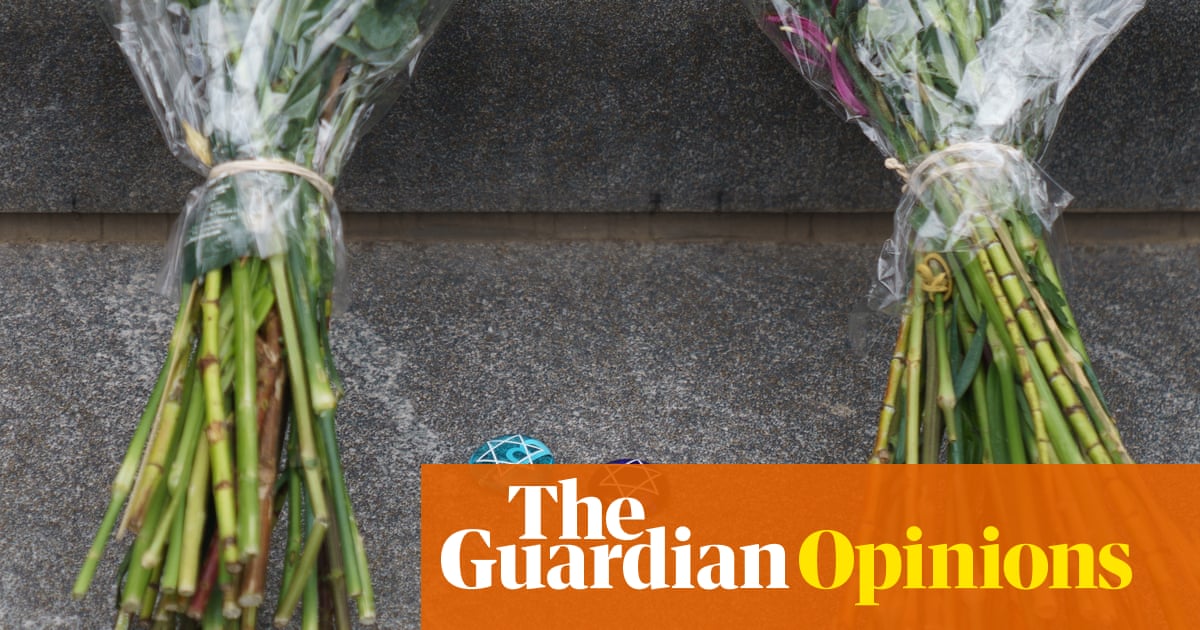Israel’s campaign of bombing and starving Palestinian civilians in Gaza is inexcusable. It reflects a massive war crime, as the international criminal court has alreadycharged, and arguablygenocide. But it in no sense justifies the murder of two young Israeli embassy workers in Washington by a man who thenchanted: “Free, free Palestine”. Nothing justifies violence against civilians.
The killing of Yaron Lischinsky and Sarah Milgrimoccurredon Wednesday evening outside the Capital Jewish Museum, where the American Jewish Committee was hosting a reception for young diplomats. The suspect, identified as Elias Rodriguez of Chicago, was detained shortly after the shooting. His social media accounts indicated that he had been involved in pro-Palestinian activism.
Beyond that, we don’t know exactly what motivated him, but he is likely to have acted in retaliation for Israeli atrocities in Gaza. That would be unequivocally wrong.
That is not to deny the severity of what Israel is doing in Gaza. As the news spread of the killings in Washington, Israeli strikes in Gaza killedat least 86 people, according to Gaza’s health ministry. After an11-weektotal blockade of Gaza, Israel has begun to allow in a merepittanceof humanitarian aid. Even the Israeli prime minister, Benjamin Netanyahu, described it as “minimal”, just enough to avoid problems with the US government. At least 29 children and elderly people have already died from “starvation-related” deaths in recent days, the Palestinian health ministersaid, warning that thousands more are at risk.
To make matters worse, Netanyahu has expanded his war aims. No longer is he seeking only the release of Hamas’s hostages and its relinquishment of power. He now alsosaysthat Israel will not stop fighting untilDonald Trump’s grotesque plan to expel all Palestinians from Gaza is implemented – a massivewar crimeand likely crime against humanity.
International humanitarian law, or the laws of war, donotapply to the gunman in Washington. That law is meant for governments and organized military forces. By all appearances the gunman was acting on his own. But the principles of international humanitarian law can help us to assess this crime.
A basic premise of that law is that war crimes by one side never justify war crimes by the other. The duty to comply with international humanitarian law is absolute, notreciprocal.
That same law mandates thatciviliansare never legitimate targets unless they take a direct part in hostilities. The two victims in Washington were doing no such thing. Lischinsky, was reported to be a research assistant in the political department at the Israeli embassy. Milgrim organized trips to Israel. Neither activity is remotely military in nature. These two young adults would be utterly inappropriate targets even in war, and needless to say, there is no war in Washington.
Frustration at Israeli atrocities in Gaza is understandable. There seems to be nothing that the Israeli government can do that would stop Trump from continuing to arm and fund it. But endorsing murder because of the other side’s atrocities is a sure path to a bloodbath. Indeed, it was that war-crime logic that seems to have led the Israeli government, responding to Hamas’s murder and abduction of civilians on 7 October 2023, to have pursued its war in Gaza withlittle regardfor the lives of Palestinian civilians that it has killed in the tens of thousands.
Difficult as it may be to accept, the proper response to Israeli war crimes is condemnation, prosecution and halting the arming and funding of these atrocities, but not acts of violence against civilians who are somehow associated with Israel or its government.
But that is not a point the Israeli government seems to want to make. Having itself engaged in tit-for-tat killings, the Israeli government instead tried to profit from the disturbing episode by blaming its critics. Israel’s foreign minister, Gideon Sa’ar,said: “The attack is the direct consequence of the virulent and toxic antisemitic rhetoric against Israel and Jewish communities around the world that has been going on since October 7.”
That is wrong on two counts. First, there is no evidence that the gunman acted because of Israel’s critics as opposed to Israel’s conduct. Second, itcheapensthe concept of antisemitism to equate it with legitimate criticism of Israeli war crimes. Antisemitism is a real and growing problem, but if the concept is misused to deflect condemnation of Israeli atrocities, it weakens protection for Jews around the world.
There are lessons to be drawn from this tragedy. Critics of the Israeli government’s atrocious conduct in Gaza should be clear that their focus is the authors: Netanyahu, the generals directing the slaughter, and the soldiers carrying it out, but not the Israeli people, not people who happen to work as civilians for the Israeli government, and not Jews.
The Israeli government might also reconsider its policy of endless reprisals. Not that I am holding my breath in anticipation, but it is nice to think that the needless and unjustified killing of these two young embassy workers could prompt a rethinking of the government’s own callous treatment of Palestinian civilians, whose horrible and mounting death toll is also needless and unjustified.
Kenneth Roth, former executive director of Human Rights Watch (1993-2022), is a visiting professor at Princeton’s School of Public and International Affairs. His book Righting Wrongs: Three Decades on the Front Lines Battling Abusive Governments was published byKnopfandAllen Lanein February.
